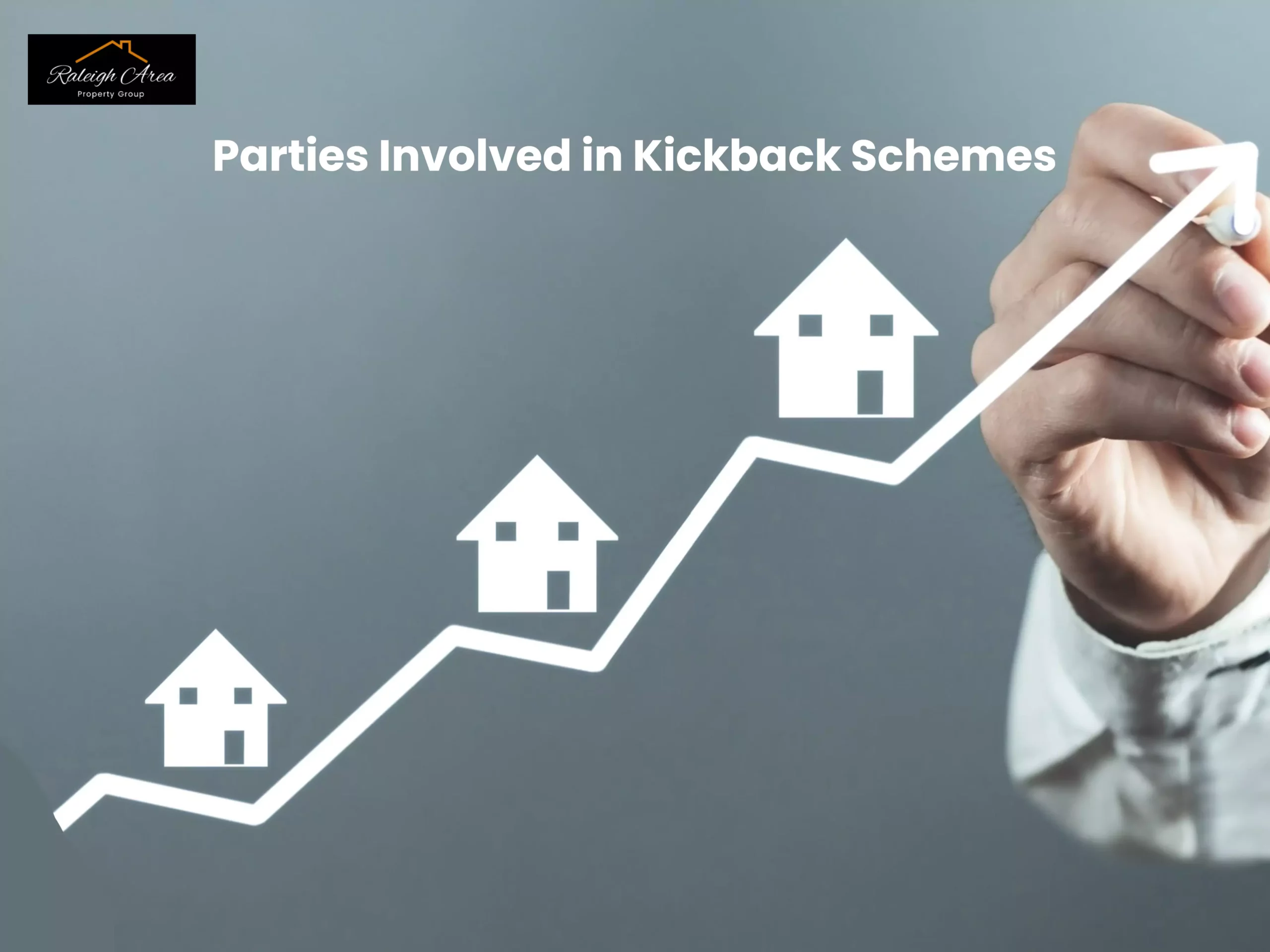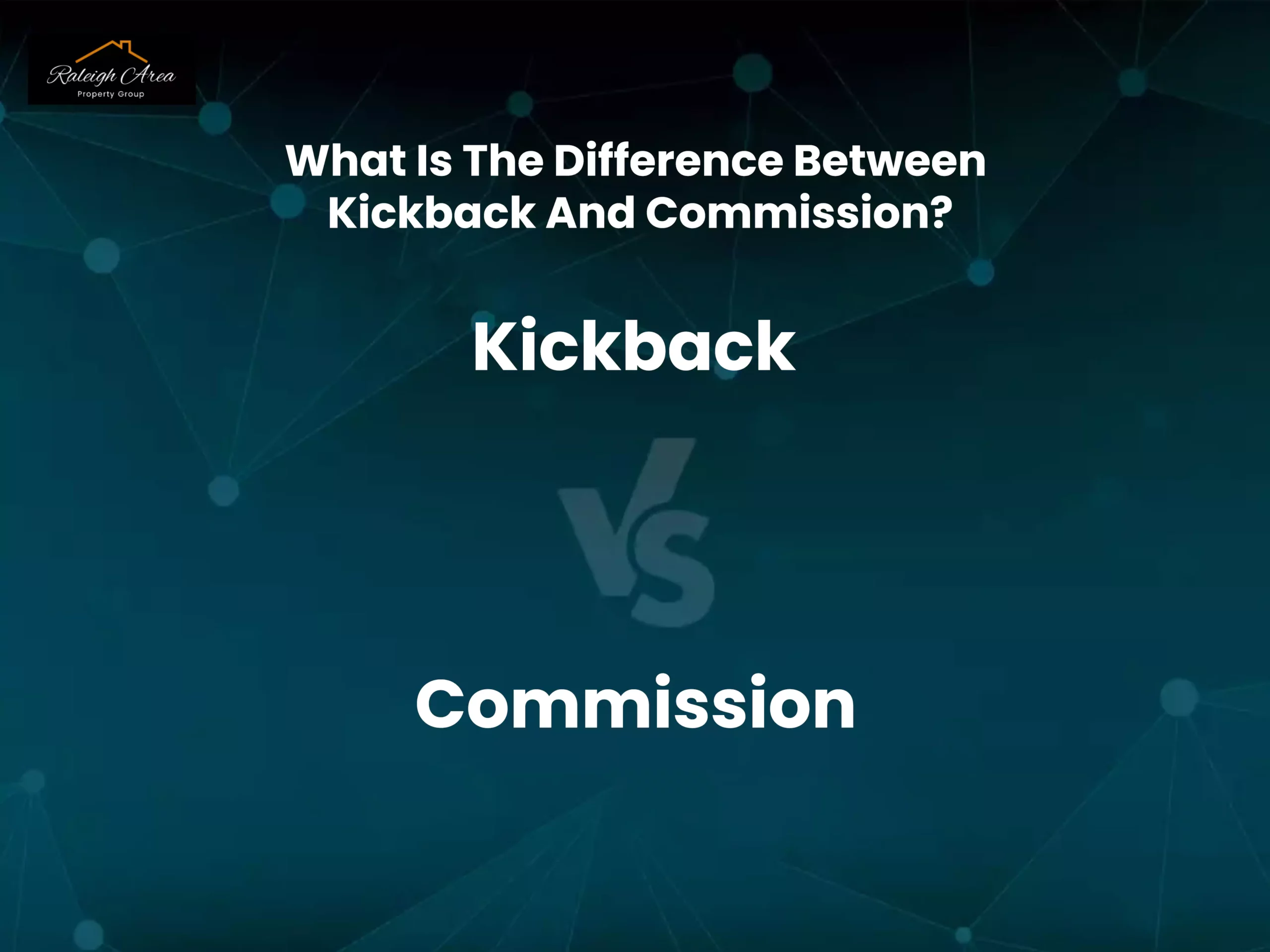Transactions in the real estate market are based on ethics, transparency, and trust. Those participating in these transactions could occasionally use unethical behavior to obtain an unfair advantage or financial profit. The acceptance or provision of kickbacks is one example of such behavior.
In this blog, we will delve into the concept of kickbacks in real estate and everything you need to know about it.
What is a Kickback in Real Estate

A “kickback” is any unlawful or dishonest payment made to a party involved in a real estate transaction. This is offered in return for favorable treatment or influence. Kickbacks are typically seen as unlawful and immoral because they have the potential to compromise the integrity of the transaction process.
What Is An Example Of A Kickback?
A perfect example of a realtor kickback to the buyer would be a mortgage broker offering a real estate agent a cash payment or referral commission. This can be in exchange for sending clients only to that specific broker.
Kickback forces an agent to recommend consumers use a mortgage broker. It can go against the agent’s duty to act in the client’s best interests.
The potential financial advantage from the bribe can influence the agent to recommend a particular mortgage choice. There may be better options for the customer. This arrangement comprises the agent’s objectivity and can lead to biased decisions.
Parties Involved in Kickback Schemes

Different parties can be involved in seller kickbacks to buyers in real estate deals. Here are a few significant individuals:
-
Real Estate Agents
Real estate agents can accept payments from other parties like mortgage brokers, house inspectors, or title firms to suggest customers or sway their decisions.
-
Mortgage Brokers and Lenders
To keep their business or impose specific loan packages, mortgage brokers or lenders can pay rebates to real estate agents or lenders.
-
Appraisers
Appraisers can collect bribes from lenders or real estate brokers to inflate property assessments and support more significant loan amounts or sales prices.
-
Home Inspectors
Home inspectors can offer bribes to real estate agents or brokers to guarantee a constant flow of referrals.
-
Title Companies and Escrow Agents
Real estate agents or brokers can receive kickbacks from title firms or escrow agents in exchange for referring clients to utilize their services.
Implications of Kickbacks in Real Estate

The consequences of kickbacks in real estate transactions can be severe:
-
Financial Impact
Kickbacks can increase expenses for buyers, sellers, or lenders. This can impact a house’s cost, the loan’s size, or the closing fees. They can lead one or more parties to the transaction to lose money while jeopardizing its integrity.
-
Competing Interests
Bribes lead to conflicts of interest because the parties can prioritize their financial interests ahead of their clients. Doing this violates the fiduciary obligation given to customers, and the real estate trust is destroyed.
-
Legal Consequences
Kickbacks are generally prohibited. This comes under several laws and rules governing real estate transactions, such as anti-corruption statutes, consumer protection laws, and standards of professional behavior.
Bribery-related actions can result in civil fines, exclusion from employment, and possibly criminal charges. Fines, restitution, license suspension or revocation, and even imprisonment are all possible punishments (source).
-
Reputational Damage
Kickback scheme participants run the danger of seriously harming their reputations. The rapid dissemination of information about unethical behavior can harm their credibility and future commercial chances.
To get the ideal solutions for your real estate requirements, hire professionals like Raleigh Area Property. Thanks to them, you will be protected from scams and fraud!
Are Kickbacks Illegal, And What Are Warning Signs?
Kickbacks are generally unlawful. They entail shady payments paid to someone in exchange for favorable treatment or influence over a transaction. Depending on the jurisdiction, participating in kickback schemes can result in civil penalties, fines, license revocation, or even criminal prosecution.
These indications should inspire suspicion and additional inquiry even though they do not definitively indicate the existence of a kickback. Some warning signs include:
-
Unusual or Excessive Fees
A kickback system can be present if a service provider’s fees appear expensive or excessive compared to industry norms—for example, those of a mortgage broker or house inspector.
-
Exclusive Referral Agreements
An indemnity contract can be present when brokers or experts only recommend customers to particular service providers without giving them a rationale or prior warning.
-
Lack of Transparency
When it comes to disclosure of financial agreements, including Lack of information, such as hidden payments or referral fees, can be a sign that kickbacks are being attempted to be concealed.
-
Pressure to Use Specific Providers
It can signify a kickback scheme if parties involved in real estate transactions, such as brokers or lenders, are under undue pressure to employ certain privacy insurance services.
-
Financial Incentives or Rewards
A kickback plan can be attempted if financial incentives, prizes, or gifts are given or received that go outside customary business procedures.
-
Inflated Prices or Costs
Prices or expenditures associated with real estate transactions that exceed market averages without explanation can indicate a bribery scheme’s presence.
-
Collusion and Exclusive Agreements
Exclusive partnerships or joint ventures between the parties out of the ordinary can be signs of a kickback agreement.
What Is The Difference Between Kickback And Commission?

The legality, transparency, and payment purpose distinguish a kickback from a commission.
-
Kickback
A kickback is an illegal or unethical payment for preferential treatment or influence in a transaction. Kickbacks are typically undisclosed and may involve secret agreements or hidden payments between parties involved in the transaction.
-
Commission
A commission is a legitimate payment earned by individuals or entities for providing a service or facilitating a transaction. In real estate, agents typically earn a realtor commission credit to buyers to assist clients with buying or selling properties.
What Happens If A Realtor Is Caught Receiving A Kickback?
If a realtor is caught receiving a kickback, serious consequences can follow, both legally and professionally. Kickback is the easiest way to get a real estate agent in trouble.
Here are some potential outcomes.
Here are some potential outcomes:
-
Legal Consequences
Kickback schemes are usually forbidden and can result in civil and criminal consequences. The particular legal repercussions will vary depending on the jurisdiction and the seriousness of the violation.
-
Regulatory Actions
Disciplinary measures against the realtor can be taken by organizations in charge of regulating real estate professions. Their professional license can be suspended or revoked in addition to warnings and reprimands.
The realtor’s capacity to work in the industry might be seriously compromised.
-
Reputational Damage
The image and credibility of a realtor might suffer significantly if they are discovered to have accepted a kickback. The rapid dissemination of information about unethical behavior can result in a loss of confidence from customers, peers, and the larger real estate community.
A damaged reputation can be difficult and time-consuming to repair.
-
Lawsuits and Civil Claims
The realtor can be sued in civil court by people or organizations harmed by the kickback system. This is to recover damages for economic losses, breaches of fiduciary responsibility, fraud, or other similar issues.
These legal procedures can further harm the realtor’s professional and financial standing.
-
Professional Consequences
Organizations and groups for real estate professionals may take legal action against brokers who participate in kickback schemes. The realtor’s professional network and any future business possibilities can be significantly impacted.
Their access to tools for the sector can be lost, and professional memberships can be terminated.
-
Loss of Career and Income
A realtor who is found accepting kickbacks could lose their job and income. This depends on the seriousness of the infraction and the disciplinary actions taken by the legal and professional authorities.
The harm to their professional status and reputation can make it difficult for them to find work or launch a successful real estate practice in the future.
Can You Gift A Client Without It Being A “Kickback?”

Giving a customer a gift is permissible without being viewed as a “kickback.” The purpose and setting of the gift are crucial. A genuine gift is offered without conditions as part of an established personal or professional connection.
It can also be a sign of appreciation or goodwill. It must be reasonably valued, openly reported and follow all applicable rules and laws. Gifting can strengthen connections without straying into unethical tactics.
This is okay if ethical behavior, openness, and a focus on the client’s best interests are upheld.
Difference Between “Referral Fees” Or “Finder’s Fees” And Kickbacks
The main distinction between “referral fees” or “finder’s fees” and kickbacks is the former’s legitimacy, openness, and intended use in a commercial setting.
Referral Fees or Finder’s Fees
Referral fees or finder’s fees are acceptable kinds of payment in real estate. They are made to people or organizations in exchange for introducing or discovering customers or business possibilities.
These costs are frequently stated up front, accepted by all stakeholders, and are a standard procedure in many businesses. They act as payment for the crucial function of bringing people together and fostering commercial contacts.
They are considered lawful when referral fees are open and adequately stated. They should reflect a just and reasonable payment for the offered reference or finding service.
Kickbacks
Kickbacks, conversely, refer to payments paid to someone illegally or unethically in return for special treatment or influence over a transaction.
Kickbacks are typically hidden, covert payments intended to influence a transaction’s outcome in favor of the party giving them.
Difference Between “Closing Cost Credit” And “Kickbacks”

In a real estate transaction context, “closing cost credit” and “kickbacks” differ in intention, legality, and transparency.
Closing Cost Credit
In a closing cost credit, the seller consents to provide the buyer with a financial credit for a certain amount of closing fees. This credit is usually discussed and disclosed to all parties involved in the transaction as part of the purchase agreement.
A closing cost credit is intended to assist the buyer in offsetting some of the closing-related costs, such as loan origination fees, title insurance, or escrow fees. As long as they are appropriately disclosed and agreed upon by all parties, closing cost credits are legal.
They are customary practices in real estate transactions.
Kickbacks
As previously stated, kickbacks refer to unethical real estate practices in exchange for favorable treatment or sway. Typically hidden and covert, kickbacks try to influence the transaction process for private advantage.
In contrast to closing cost credits, Kickbacks are seen as dishonest and generally forbidden. They transgress the ethical standards of fairness, openness, and honesty in real estate dealings.
What Is A Rebate In Real Estate

A financial incentive or return a real estate agent or broker offers to a buyer or seller is referred to as a rebate in the industry. This seller rebate at closing is often offered to return a portion of the agent’s commission to the customer.
It is calculated as a percentage of the transaction’s total commission. Rebates are frequently provided to draw customers and provide them with financial benefits. Notably, rebate rules differ by jurisdiction, and some areas have limitations or specifications on their use.
To learn more about the specifics of rebates in their region, clients can study their local rules and regulations and speak with their real estate representative.
Conclusion
This was all about what is a kickback in real estate. A kickback is an illegal or unethical payment given to a person engaged in a real estate transaction in exchange for favorable treatment or influence.
In general, kickbacks are seen as illegal and immoral actions. They compromise fairness, openness, and the integrity of the transaction process.
Hire professionals like Raleigh Area Property for all your real estate requirements to avoid this bother. We provide expert services and should be your go-to place for all buy and sell residential and commercial real estate requirements.



[…] You may also like: Understanding Kickbacks in Real Estate: Explained by Expert […]
[…] A top real estate agent in NC is a living manual of their community. They thoroughly know market dynamics, neighborhood trends, and property values. With this information, they assist customers in making wise choices, ensuring that homes are priced competitively for sellers and that purchasers get the most incredible offers. Market-savvy agents are crucial in any real estate transaction because they foresee changes, spot opportunities, and expertly negotiate market complexity. Also Like To Read: Understanding Kickbacks in Real Estate: Explained by Expert […]
[…] Also Like To Read: Understanding Kickbacks in Real Estate: Explained by Expert […]